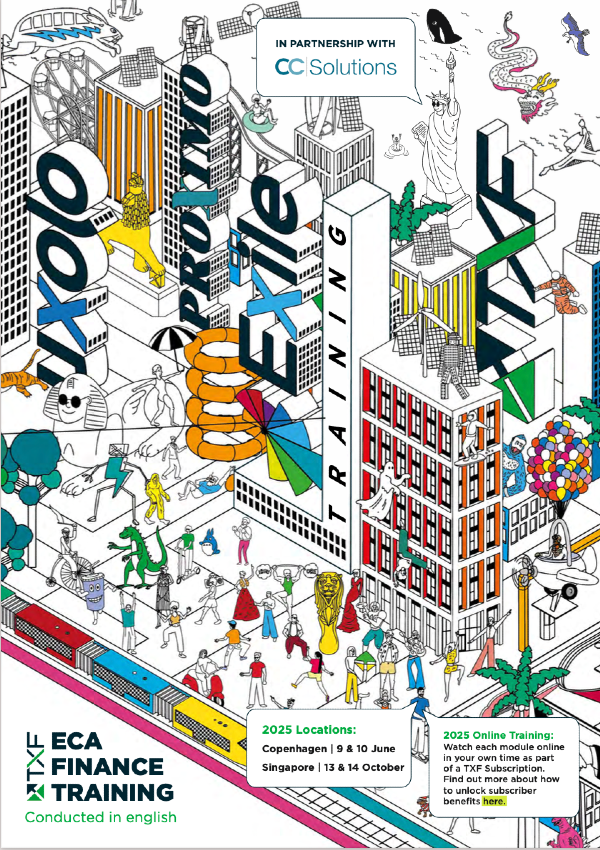No going back to the old normal before trade wars in Asia
Corporate supply chains are now accommodating trade wars, but things will not go back to where they were once peace breaks out. Katharine Morton takes the Asian perspective on the new normal.

“You can get used to anything. Normality is like some tenacious waste-ground weed: it will establish itself in the most unlikely places.” I was reminded of that quote from William Boyd in the novel New Confessions as I was chairing our Singapore financing and insuring commodities event on 5 March. The threat of an elevation in the tariffs that President Trump made on China had just been lifted, or at the least, pushed aside for a while, although the outcome of the trade wars is unresolved. Nonetheless, one of the panellists (the event is under Chatham House Rule, so I won’t say who), said that even if trade wars end, supply chains won’t go back to the same state. “Changes have been made in corporate supply chains that are not easily reversed,” he said.
Neutral to positive on trade wars – in Asia
The ‘new normal’ that has rapidly evolved around the trade wars has been neutral to positive to players in Asia. This was one of the key takeaways from the event, and was evidenced in our audience response poll. When asked if they were worried about trade wars, 16% of participants said yes, but nearly one half of respondents (49%) said ‘yes, but it presents opportunities’. Significantly, more than one third [34%] said they weren’t worried (and they were ‘bored of being asked the question’!). Asked a similar question in the US at TXF’s Miami event only two weeks earlier, the geopolitical issue the audience was most concerned about in 2019, 58% said that it was trade wars.
The upside for the US that President Trump had promised from the ‘good and easy to win’ trade wars certainly has not been apparent. Indeed, evidence continues to mount that the people bearing the brunt of trade wars so far are US corporates and consumers. According to the Federal Reserve Bank of New York, tariffs on $250 billion imports from China were costing US companies and consumers around $3 billion a month in additional tax costs and companies were bearing another $1.4 billion in deadweight losses. The study estimates the tariffs were causing a diversion of $165 billion a year in trade, raising substantial costs for companies that needed to restructure their supply chains.
Structural changes that are happening in China and elsewhere in Asia (amid, but not necessarily because of) trade wars are also causing indirect impacts on supply chains, panellists in Singapore said. This includes VAT reductions in China which may boost onshore manufacturers. Structural changes in India, including a new insolvency and bankruptcy law overseen by the new National Company Law Tribunal, are helping open up avenues for foreign investors. In Indonesia, previous tax amnesties are enhancing dollar liquidity, panellists said. Being nimble has helped corporates in Asia take advantage of changes, one corporate panellist noted.
But financing those changing supply chains is another issue entirely. Traditional sources of finance remain the mainstay of commodity finance in Asia. Significantly, 69% of the audience saw traditional bank funding as the being most promising source of finance in 2019, as against 14% for non-bank financial institution sources and only 8% for the capital markets and 9% institutional investors.
This was an event where we discussed how commodity trade should be insured. Insurers were criticised for having knee jerk reactions to international events, such as regulation and trade wars, which “freeze the whole insurance market” according to one speaker. That is a problem for corporate risk managers. As one trader said “the long term credit requirements [of the industry] are financed by short term trade finance, which distorts the market.” With consolidation in the market, panellists cautioned that the larger players in the market will have to innovate to stay relevant, but that the broker relationship will remain the main interface, a point agreed upon by the majority of the audience (53%). Although 32% did say that the ‘relationship between brokers and underwriters will completely change’, only 15% thought they wouldn’t be using a broker in five years’ time.
It (still) ‘aint easy being green
One area where the new normal needs must be better than the old normal is in sustainable finance. It continues not to be easy being green (I have been depressed by this since I edited Euromoney’s “Environment Risk” in 1992 on the first wave of ‘greenwash’ (what we called green marketing)). JB wrote comprehensively about this last week, but it bears repetition that coal still powers nearly 40% of global energy. One of the panellists emphasised that “the green bond market doesn’t work” in its current iteration (in which only 2% of bonds are ‘green’), and went on to say “every bond should be green by default”. Until externalities (which now include Sustainable Development Goals (SDGs)) are properly priced into bond issues, that isn’t going to happen. With a strong will (and continued regulatory push), some things will change.
Digitisation non-negotiable
“Digitisation is non-negotiable. It’s a must,” says one panellist. Singapore itself is a flagbearer in the whole digitisation journey for trade (and for commodities in particular). The Networked Trade Platform perspective as a one-stop trade digital hub and its initiative with Hong Kong to form the Global Trade Connectivity Network, which aim to play complementary roles to link up the global trade ecosystem.
The audience itself wasn’t necessarily a banner for digitisation but they had ‘the basics covered’, according to 63% of respondents (23% admitted to having the equivalent to ‘coal powered computers’, according to the tongue in cheek questions). That said, usage of online trade platforms is increasing and blockchain-based open platforms such as komgo, which was founded last Autumn by 15 shareholders (a combination of banks, commodity players and corporates) launched in January attempts to create (in its words) a ‘decentralised solution enabling seamless data communication between commodity trade institutions, corporations, inspection companies, and third parties’.
There have been many proofs of concept (POC) in blockchain, and as one panellist noted “POC only means one thing – to test that it works, not that it is economically viable”. Interestingly (and somewhat confusingly), as one of the proponents of blockchain technology said, “Blockchain isn’t about technology, it is about leadership”. Standardisation will be important. Nonetheless, the same speaker also said there should be convergence on key standards, not that everything should be the same. Creating a template letter of credit is one thing, but as that participant said, “every LC is a negotiation”, so cookie cutter options have their limitations. One player quipped ‘everyone wants a blockchain of their own’, but they have a point, interoperability is not going to be easy.
I’m going to be back in Singapore on 9 May, continuing some of the conversations with our new FIT MasterZone on trade, treasury and risk. I do hope to see some of you there.
Now time to get up to speed on the markets.
Here's our exclusive TXF Essentials subscriber content
S&W: Can trade laws catch up with electronic payment instruments?
In the latest edition of law firm Sullivan & Worcester’s Trade Finance Breakfast Seminar, partner Simon Cook asks whether the legal framework underpinning letters of credit and bills of lading is effective enough to manage electronic payment instruments going forward?
Navigating the digital project corridor
With the European fibre market entering the project financing mainstream, how big can the wider digital infrastructure market get, and what risk mitigants are still needed to give investors and lenders more comfort with non-fibre niches?
Export Credit Norway: Fishing for new ECA ideas
TXF spoke with Ivar Slengesol, director of strategy and business development at Export Credit Norway, to discuss his newly created role and how the Norwegian ECA plans to find new growth markets in 2019.
Beyond Libor: SOFR so good?
After Libor’s repeated missteps, a replacement rate - SOFR - is ready for roll-out. In part two of the Beyond Libor Series, Berkeley Research Group’s Michael Whalen looks at what this might mean for infrastructure finance.
Changing horses mid race: When SCF programmes switch owners
The proposed move of GE Capital’s SCF programme to MUFG raises many questions. How does 'porting' SCF from one provider work (or not), and what makes a corporate choose a bank over a non-bank provider (or otherwise)? What happens to the long tail? TXF spoke to banks and platform providers to gauge their views.
Plus, to top things off... the news you thought you had but didn't
Lordstown reprices and upsizes
Sponsors of the 940MW Lordstown Energy Centre in Ohio – Macquarie Infrastructure Partners' III fund, Siemens Financial Services and Clean Energy Future…
The Carlyle Group seals acquisition loan for US wind projects
Private equity firm, The Carlyle Group, closed a $130 million seven-year term loan on 28 February 2019 to finance the acquisition of six wind projects in upstate…
Klein joins LC Lite
Duncan Klein has joined LC Lite - a newly launched blockchain-based platform for letters of credit - as head of funding. Klein previously spent 21 years at J.P Morgan…
Southern Gas Corridor pulls UFK loan
Azerbaijan's Southern Gas Corridor CJSC - owned by the Ministry of Economy of Azerbaijan Republic (51%) and SOCAR (49%) – has decided to not proceed with…
Advisory bid deadline for Zambezi hydro nears
Prospective transaction advisers for the $2 billion 1.3GW Mphanda Nkuwa IPP hydropower project in Mozambique have until 22 March 2019 to submit…
Final offers in for RCEA toll concession
The two shortlisted bidding groups for the €500 million ($565 million) Route Centre-Europe Atlantique (RCEA) motorway upgrade project in France are said…
Angola's Caculo Cabaca hydro sounds out banks
Angola’s Ministry of Finance is currently sounding out banks for around $4 billion of ECA-backed debt to finance the construction of the 2,172MW Caculo Cabaca…
More details emerge on Rabigh 3 IWP
Sponsors of the Rabigh 3 independent power and water project (IWP) in Saudi Arabia – ACWA Power (70%) and Saudi Brothers Commercial Company (30%)…
Newell joins Rabobank as senior counsel
Adrian Newell has joined Rabobank as senior counsel and will be based in London. Newell will be working as part of the trade and commodity finance team and will focus…
Bids in for Dunkirk offshore wind tender
Bids for the 500MW Dunkirk offshore wind tender are due today (15 March). The winning bid will be selected in Q3 2019…
KCIA bond issue nears
An issue of special obligation bonds to fund the $1.5 billion Kansas City International Airport (KCIA) redevelopment project is expected to be launched after…





